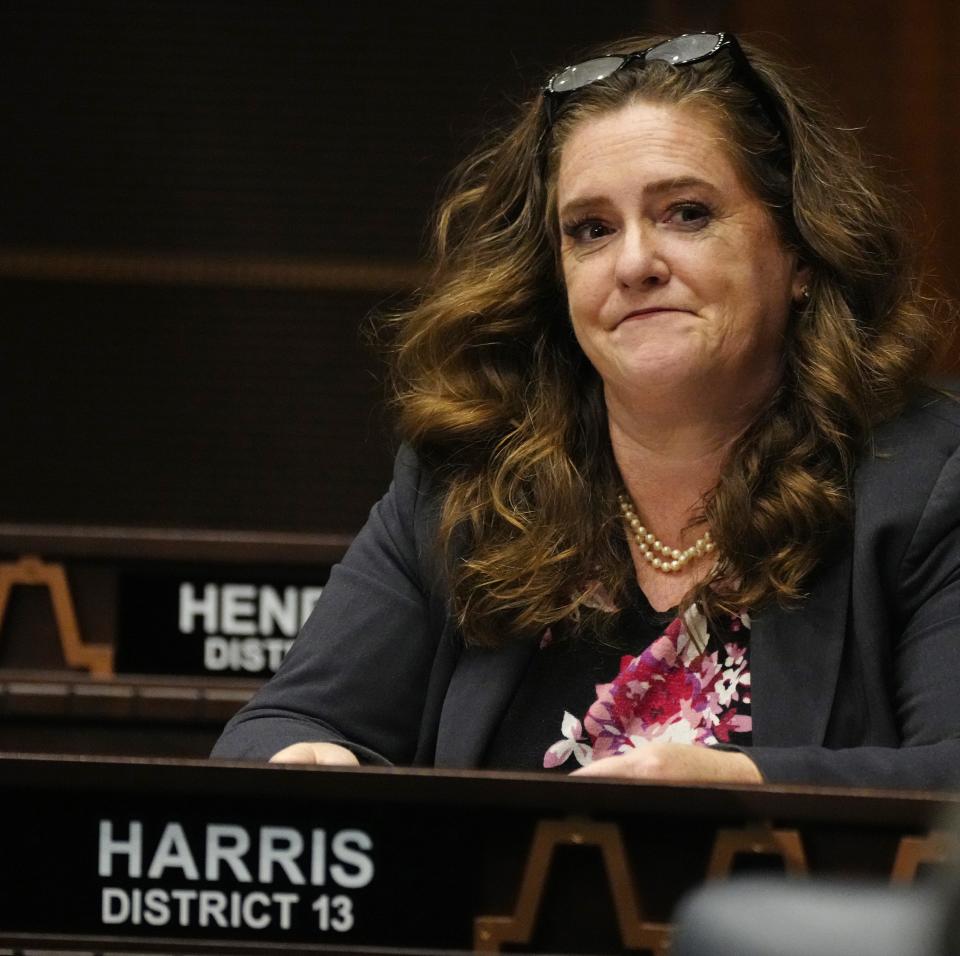Arizona state Rep. Liz Harris says Constitution required her to allow baseless cartel bribery claims
- Oops!Something went wrong.Please try again later.
A lawmaker whose invited guest speaker accused public officials and the LDS church of conspiring with a Mexican drug cartel told a House ethics panel she had a constitutional duty to allow the testimony.
Rep. Liz Harris, R-Chandler, was hit with an ethics complaint last month after her guest, Scottsdale insurance agent Jacqueline Breger, presented the allegations at a joint Senate and House elections committee hearing.
"The Legislature cannot abrogate the power of the people to freely speak of their grievances or block them from our legislative house and access to their servants," Harris wrote.
Rep. Stephanie Stahl Hamilton, D-Tucson, who filed the complaint, said the presentation amounted to "disorderly conduct" by Harris and made Arizona a "national joke."
Drug cartel smear:Rep. Liz Harris hit with ethics complaint after election hearing
Breger's testimony was based on fictitious claims that her boyfriend, Scottsdale lawyer John Thaler, had made in court filings against his ex-wife and former mother-in-law. The allegations caused numerous election conspiracy believers in Arizona and elsewhere to demand the arrest of supposed cartel bribe-takers, including Democratic Gov. Katie Hobbs and Republican House Speaker Ben Toma. Thaler later claimed that the chair of the Senate Elections Committee, Sen. Wendy Rogers, R-Flagstaff, also was potentially connected.

In a three-page response to the ethics complaint, Harris didn't mention what she knew about the allegations before allowing Breger to present them. She denied the complaint's charge that she committed disorderly conduct, saying her actions didn't meet common definitions of the term, such as creating a hazardous or "physically offensive condition" or using language to create the possibility of injury or a breach of the peace.
The response contains a lengthy explanation of how the Arizona Constitution affords people the right to "freely speak" to their elected officials, especially when they feel new laws could help "block the danger of mal-administered elections."
Roberts:Republican lawmakers run from a motion to censure Rep. Liz Harris for drug cartel smear
In fact, both the House and Senate have rules that bar any speaker from disparaging lawmakers or political parties, and lawmakers have ordered people giving testimony in committee hearings not to use terms including "conspiracy theory" while speaking.
Harris invited her lawmaker peers "in love and peace" to obey the oath they swore to the state Constitution.
Harris didn't reply to requests for comment and hasn't spoken to reporters about the matter. Her response to the ethics committee was dated March 13.
Harris backs away from claims in hearing
Despite her insistence in the letter that Breger and Thaler had a right to present their fake claims under the imprimatur of the state Legislature, Harris released a short statement to her followers on Telegram on Feb. 28 that the presentation "was not sufficient to substantiate these extraordinary claims."
Harris has not said publicly whether she knew the claims had serious credibility problems before she put a spotlight on them at the hearing.
Jennifer Wright, an attorney and former Election Integrity Unit chief at the state Attorney General's Office, posted on Twitter last month that Harris discussed the alleged bribery scheme with her at a meeting in January. Also, a few minutes of internet research could have turned up Thaler's divorce-related court filings outlining the same scheme, which one judge called "delusional."
The five-member House Ethics Committee chaired by Rep. Joseph Chaplik, R-Scottsdale, could dismiss the complaint or recommend discipline from censure to expulsion that House members would vote on.

Stahl Hamilton told The Republic she would "let the process unfold" and make comments after the Ethics Committee makes its recommendation.
The committee is scheduled for a March 23, live-streamed administrative meeting, where no evidence or testimony will be received. It's not clear if the committee will discuss the Harris complaint.
Reach the reporter at rstern@arizonarepublic.com or 480-276-3237. Follow him on Twitter @raystern.
This article originally appeared on Arizona Republic: Rep. Liz Harris points to Arizona Constitution in ethics defense

